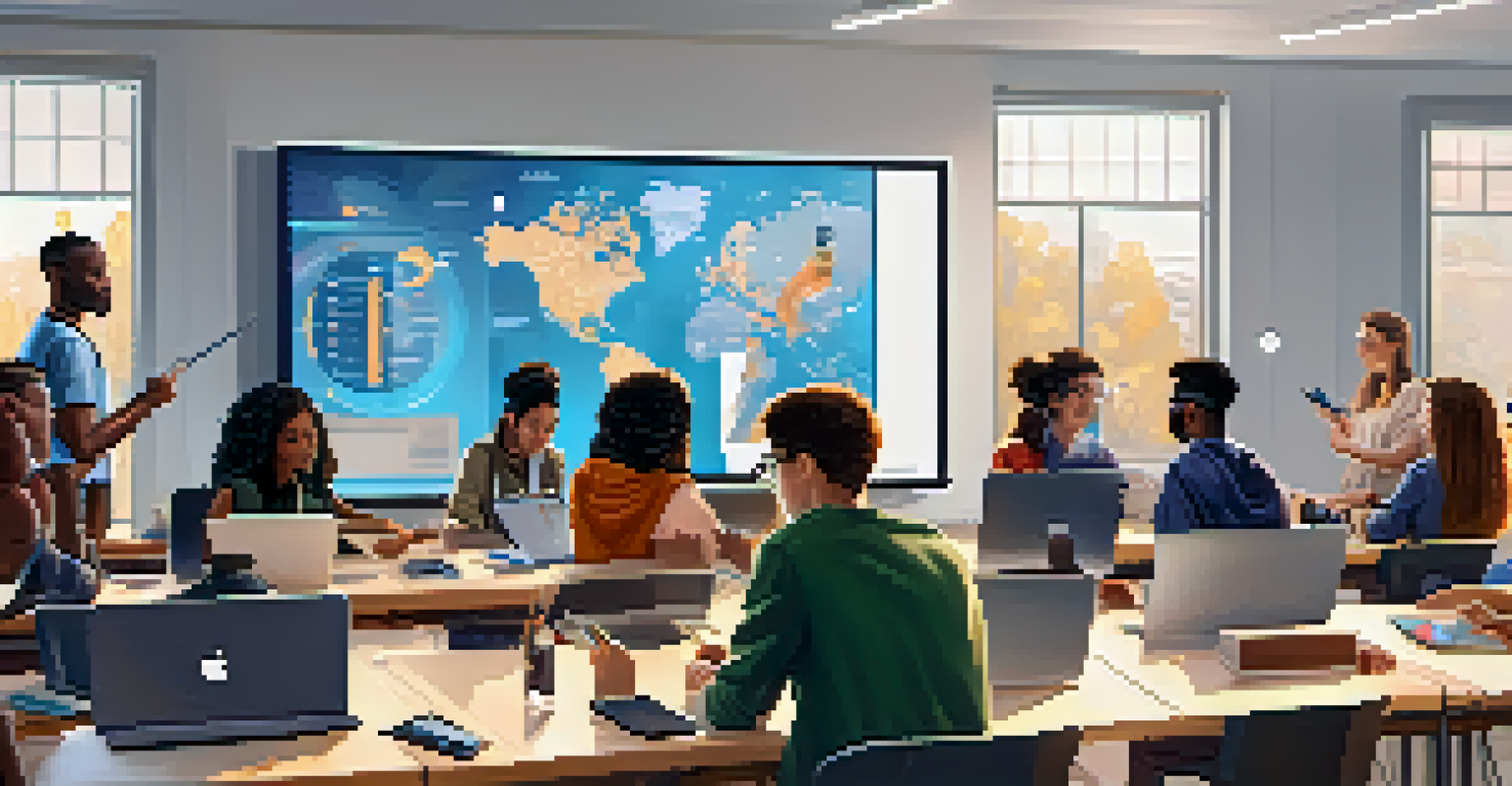Online Learning Platforms: Revolutionizing Access to Education

Introduction to Online Learning Platforms
Online learning platforms have emerged as game-changers in the education landscape. They provide a flexible and accessible way for learners to acquire knowledge and skills, regardless of their geographical location. With just a device and an internet connection, anyone can access a wealth of resources and courses tailored to their needs.
Education is the most powerful weapon which you can use to change the world.
These platforms cater to a diverse audience, from students seeking help with academic subjects to professionals looking to upskill in their careers. Popular platforms like Coursera, Udemy, and Khan Academy exemplify how technology can bridge gaps in traditional education. By offering a variety of learning formats, they meet the preferences of different learners.
In essence, online learning platforms are democratizing education, making it possible for anyone to learn anything at any time. This shift not only empowers individuals but also helps to create a more educated global population, ready to tackle the challenges of the modern world.
Benefits of Online Learning Platforms
One of the most significant advantages of online learning platforms is their flexibility. Students can learn at their own pace, revisit lectures, and fit study time into their busy schedules. This adaptability is particularly beneficial for those juggling work, family, or other commitments.

Moreover, online platforms often provide a wider range of courses than traditional institutions. From niche subjects like blockchain technology to popular skills like graphic design, learners can explore topics that interest them without being confined to a set curriculum. This variety fosters a culture of lifelong learning.
Flexibility in Learning Experience
Online learning platforms offer flexibility, allowing students to learn at their own pace and fit education into their busy lives.
Additionally, many online platforms offer affordable options, making education more accessible to everyone. With free courses and financial aid available, individuals from various economic backgrounds can benefit from high-quality educational resources.
The Role of Technology in Online Education
Technology plays a pivotal role in enhancing the online learning experience. Interactive tools like quizzes, discussion forums, and multimedia content engage learners and promote retention of information. These features create a dynamic environment that mimics the interactivity of a classroom setting.
Online learning is not the next big thing, it is the now big thing.
Furthermore, advancements in artificial intelligence (AI) are personalizing education like never before. Adaptive learning technologies analyze a student’s performance and tailor content to suit their learning style and pace. This individualized approach helps learners grasp challenging concepts more effectively.
As technology continues to evolve, the potential for online learning platforms to innovate and improve increases. Virtual reality (VR) and augmented reality (AR) are on the horizon, promising immersive learning experiences that could revolutionize the way we acquire knowledge.
Challenges Faced by Online Learning Platforms
Despite their numerous advantages, online learning platforms face some challenges that need addressing. One major issue is the digital divide; not everyone has equal access to the internet or devices. This disparity can hinder opportunities for those in underserved communities.
Additionally, the lack of face-to-face interaction can make it difficult for some students to stay motivated and engaged. While online discussions can facilitate communication, they often lack the personal connection found in traditional classrooms. This can lead to feelings of isolation for some learners.
Technology Enhances Engagement
Interactive tools and advancements like AI personalize the online learning experience, making it more engaging and effective for students.
Moreover, the sheer volume of available courses can be overwhelming. With so many options, learners may struggle to choose the right course or may feel lost in the vast sea of information. Guidance and support are essential to help students navigate their educational journeys successfully.
Success Stories from Online Learning
Many individuals have transformed their lives through online learning platforms. For instance, a working professional might take a graphic design course on Udemy, enabling them to switch careers and pursue their passion. These success stories highlight the empowering nature of accessible education.
Moreover, students in remote areas have used online platforms to gain a quality education that may not be available locally. By connecting with expert instructors and resources, they have achieved academic success and opened doors to future opportunities. This showcases the potential of online learning to level the playing field.
Additionally, businesses are leveraging online learning to upskill their workforce. Companies like Google and IBM offer training programs through platforms to ensure their employees stay current with industry trends. This not only benefits the employees but also enhances the organization's competitiveness.
The Future of Online Learning Platforms
The future of online learning looks promising, with continuous advancements in technology and pedagogy. As more institutions recognize the value of blended learning approaches, we can expect to see a hybrid model combining online and in-person education. This could offer the best of both worlds.
Furthermore, the integration of social learning features will likely enhance collaboration among students. By facilitating group projects and peer-to-peer interactions, learners can benefit from shared knowledge and experiences, creating a richer educational environment.
Challenges of Accessibility
Despite their advantages, online learning platforms face challenges such as the digital divide and motivation issues due to a lack of personal interaction.
As we move forward, it’s essential for online learning platforms to remain adaptable and responsive to the needs of learners. By prioritizing accessibility, engagement, and innovation, they can continue to revolutionize education and empower individuals across the globe.
Conclusion: Embracing the Online Learning Revolution
In conclusion, online learning platforms are reshaping the educational landscape, making it more inclusive and accessible. They provide numerous benefits, from flexibility and affordability to a vast array of courses tailored to individual interests. As technology continues to advance, these platforms will only become more effective.
However, it’s crucial to address the challenges that exist to ensure equitable access for all learners. By investing in infrastructure and support systems, we can bridge the digital divide and foster an environment where everyone has the opportunity to succeed.

Ultimately, embracing this revolution in education is not just about technology; it’s about empowering individuals to pursue their passions and achieve their goals. As we look to the future, let’s continue to champion online learning as a vital tool for personal and professional growth.